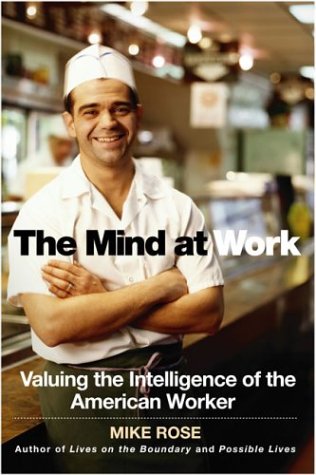 |
||
|
|
Join
The Miami Herald's Business Monday Book Club.
Click here for information.
Music Reviews and Features
Dion Dimucci
Lester Bangs in "Almost Famous"
History of Warner Brothers Music
Dining
Creolina's
Cajun/Creole
'Mind
at Work' offers intriguing portraits of workers.
Mike
Rose explores the complex skills required of people who work with their
hands, from electricians and plumbers to carpenters, welders and hairdressers.
 The
Mind at Work: Physical Work and the Thought It Takes to Do It. Mike Rose.
Penguin. 288 pages.
The
Mind at Work: Physical Work and the Thought It Takes to Do It. Mike Rose.
Penguin. 288 pages.
BY
RICHARD PACHTER
rpachter@wordsonwords.com
Why would anyone look down on skilled labor? Whether they wear white collars,
blue collars or no collars at all, the trained workers who perform specialized
tasks are imminently worthy of respect for a variety of reasons. First
of all, their jobs are mostly necessary -- ''real'' work as opposed to
make-busy stuff. Second, the amount of brainpower required is considerable.
And that's the point of this new book by Mike Rose.
When I was in college, a bunch of friends decided to take the examination
for employment with the U.S. Post Office. With the casual determination
and unambiguous confidence of youth, they took the test but subsequently
reported that they only had done so ''as a goof,'' though several sheepishly
admitted that they were ''stunned'' -- that's the exact word they used
-- at the complexity and difficulty they had encountered.
''Worse than the SAT,'' one wag recalled with a chuckle, several decades
after the fact.
I once toured a post office where a letter-carrier buddy showed me some
of what his job entailed. This was a few years back, and I'm sure that
automation has supplanted many of the sorting tasks, but scores of very
complex memory, hand-eye and motor functions were apparent. And this was
just during the indoor part of his job, not the actual outdoor mail delivery
to homes and businesses (through rain, sleet, snow and hurricanes). It
was no wonder that a difficult entrance examination was required for the
position!
In his new book, author Rose reminisces about his mother, a waitress,
and the remarkable complexity of her job and the necessity to routinely
plan, project, react and multitask in an efficient and friendly way while
interacting with customers, cooks, bus-persons, vendors and others.
He similarly visits electricians, plumbers, carpenters, welders, hairdressers
and other people who work with their hands and other tools and instruments.
In several instances, he also depicts settings where experienced workers
are actively involved in training and mentoring young people in their
chosen fields.
For some, the successful training and integration of professional skills
into one's life, as well as the positive feedback derived from the successful
completion of these new tasks provides a huge jolt of self-esteem. For
many, this is a truly revolutionary achievement.
The power of work as an energizing force that affects growth, positive
change and socialization is especially evident in these sections. The
upwardly mobile trajectory of much of American society is clearly attributable
to this phenomenon.
Rose employs a variety of academic sources to inform and amplify his observations.
This is worth mentioning, lest anyone think this book is merely a collection
of the author's individual observations and reflections.
Throughout, Rose brings an openness and curiosity to his portrait of workers
and a sympathetic eye to the challenges of their work. There's no condescension,
pity, sappy moralizing or manifestos of class warfare. He looks at the
multitude of complex and varied skills and intellectual prowess required
to complete these jobs and puts it all into context.
You can't help but have an increased respect for the mental part of labor
as a result. It's well worth contemplating in light of the economy's ongoing
evolution and the changing roles of workers.
Like business books? Join the club.